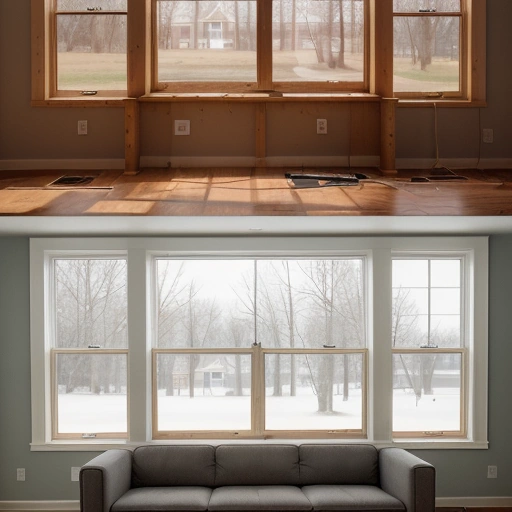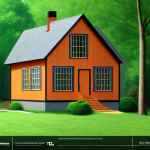Top 5 Window Replacement Options for Homes in Michigan: Saving on Energy Costs in 2024
Battling Michigan’s Climate: The Urgent Need for Energy-Efficient Windows
Michigan winters are notorious for their biting winds and sub-freezing temperatures, while summers can bring sweltering humidity. These extremes put a significant strain on home heating and cooling systems, leading to inflated energy bills. A major culprit? Inefficient windows. As we move into 2024, upgrading to energy-efficient windows is no longer just a matter of comfort; it’s a financial imperative for Michigan homeowners. This article explores the top 5 window replacement options that can significantly reduce energy costs and enhance the overall value of your home.
For Michigan homes, the impact of inefficient windows extends beyond mere discomfort. According to the U.S. Energy Information Administration, the Midwest region spends a significant portion of its household budget on energy, primarily for heating. Older, single-pane windows are a major source of heat loss during winter and heat gain during summer. Replacing these with energy-efficient windows, particularly those featuring low-E glass and insulated frames, can lead to substantial savings. In fact, studies show that homeowners can reduce their energy bills by up to 15% simply by upgrading their windows.
This not only translates to immediate savings but also increases the long-term value and appeal of your property in the Michigan real estate market. Beyond the immediate financial benefits, investing in energy-efficient windows is a smart home improvement decision with long-term implications. New window installation enhances curb appeal, making your home more attractive to potential buyers if you decide to sell. Furthermore, modern window replacement options, such as vinyl windows, wood windows, fiberglass windows, and composite windows, offer enhanced security features and noise reduction, contributing to a more comfortable and secure living environment.
When considering window ROI, it’s crucial to factor in these added benefits, as they contribute to a higher quality of life and overall property value. Choosing the right windows for the Michigan climate means balancing energy savings with aesthetic preferences and long-term durability. Understanding the specific needs of Michigan homes is crucial when selecting window replacement options. Factors like the orientation of your home, the amount of sunlight it receives, and the prevailing wind direction all play a role in determining the optimal window type.
For example, homes facing south or west may benefit from windows with a lower Solar Heat Gain Coefficient (SHGC) to minimize heat gain during the summer months. Conversely, homes in heavily shaded areas may benefit from windows that maximize solar heat gain during the winter. By carefully considering these factors and consulting with a qualified window installation professional, Michigan homeowners can make informed decisions that maximize their energy savings and enhance the comfort of their homes in 2024.
1. Vinyl Windows: Affordable Efficiency for the Modern Home
Vinyl windows have become a staple in the window replacement market, particularly for Michigan homes, due to their affordability and low maintenance, making them an attractive option for homeowners looking to save energy costs. Modern vinyl windows offer excellent insulation, especially those designed with multiple air chambers and advanced insulated glass packages. These features minimize heat transfer during Michigan’s harsh winters and reduce heat gain in the summer, leading to significant savings on energy bills.
When considering vinyl windows for your home improvement project, it’s crucial to look for windows with a low U-factor, which measures heat transfer, and a high Solar Heat Gain Coefficient (SHGC) for optimal energy performance in Michigan’s diverse climate. These ratings indicate how well the window prevents heat loss and manages solar heat, respectively, directly impacting your home’s energy efficiency and long-term window ROI. Brands like Pella and Andersen offer vinyl window options with advanced features such as Low-E coatings and argon gas fills, further enhancing their energy efficiency.
For example, the Pella 250 Series vinyl window boasts a U-factor as low as 0.25 and is specifically designed for energy efficiency, making it a popular choice for homeowners seeking to reduce their carbon footprint and lower utility bills. Similarly, Andersen’s A-Series vinyl windows incorporate innovative design elements to maximize insulation and minimize air leakage. When evaluating vinyl windows, be sure to inquire about the specific energy-saving technologies incorporated into each model and how they align with your home’s unique needs and the Michigan climate.
Beyond energy efficiency, the ease of window installation and minimal maintenance requirements of vinyl windows contribute to their overall appeal. Unlike wood windows, vinyl windows do not require painting or staining and are resistant to rot, decay, and insect infestation, saving homeowners time and money on upkeep. This makes them a practical choice for busy homeowners who want to improve their home’s energy performance without the hassle of extensive maintenance. Furthermore, the affordability of vinyl windows makes them an accessible option for a wide range of budgets, allowing homeowners to invest in energy-efficient upgrades without breaking the bank. As you plan your window replacement project for 2024, consider the long-term benefits and cost savings associated with high-quality vinyl windows, keeping in mind how they can significantly contribute to a more comfortable and energy-efficient home.
2. Wood Windows: Classic Beauty Meets Modern Efficiency
Wood windows offer a timeless elegance and inherent warmth that few other materials can match, making them a popular choice for Michigan homes where aesthetic appeal is paramount. While older wood windows were often drafty and inefficient, advancements in manufacturing and materials have dramatically improved their energy performance. Modern wood windows, when equipped with features like low-E glass, argon gas fills, and multi-point locking systems, can rival even vinyl windows in terms of energy efficiency.
For homeowners prioritizing historical accuracy or seeking to enhance the architectural character of their property, wood window replacement is often the ideal solution. The natural beauty of wood can significantly increase a home’s curb appeal, potentially boosting its value in the Michigan real estate market. One crucial factor in maximizing the energy savings of wood windows is proper window installation. A poorly installed window, regardless of its energy rating, will leak air and compromise its insulating capabilities.
When considering wood window replacement, it’s essential to work with a reputable window installation company experienced in handling wood products. These professionals can ensure a tight seal and proper weather stripping, minimizing air infiltration and maximizing energy savings. Furthermore, regular maintenance, such as painting or staining, is necessary to protect the wood from the elements and prevent rot, thereby extending the lifespan of the windows and preserving their energy efficiency. Investing in high-quality wood windows and professional window installation offers a strong return on investment (ROI) for Michigan homeowners focused on long-term home improvement.
Several manufacturers specialize in high-performance wood windows designed to withstand the rigors of the Michigan climate. Companies like Marvin and Kolbe offer exceptional wood windows with impressive energy ratings. Marvin Elevate windows, for instance, combine a durable fiberglass exterior with a warm wood interior, providing both beauty and exceptional resistance to the elements. Similarly, Kolbe VistaLuxe Collection offers clean lines and energy-efficient designs, perfect for contemporary homes. When evaluating wood window options, pay close attention to the U-factor and Solar Heat Gain Coefficient (SHGC) ratings to ensure optimal performance for your specific needs. Choosing energy-efficient windows is a crucial step in saving energy costs and creating a more comfortable living environment in 2024.
3. Fiberglass Windows: Strength, Durability, and Energy Savings
Fiberglass windows stand out in the window replacement market for their exceptional strength, durability, and energy efficiency, making them a smart choice for Michigan homes. Unlike vinyl windows which can become brittle in extreme cold or wood windows which are susceptible to rot, fiberglass resists warping, cracking, and rotting, holding its shape and structural integrity even when faced with Michigan’s fluctuating weather conditions. This inherent stability translates to a longer lifespan and reduced maintenance costs, offering a strong return on investment (ROI) for homeowners focused on long-term home improvement.
Moreover, the ability to paint fiberglass windows allows homeowners to customize their appearance to match any home’s exterior, boosting curb appeal and potentially increasing property value in the Michigan real estate market. To maximize energy savings, look for fiberglass windows with multi-pane glass, low-E coatings, and insulated frames. These features work together to minimize heat transfer, keeping homes warmer in the winter and cooler in the summer, thereby saving energy costs. For instance, windows with low-E glass reflect radiant heat, reducing the amount of heat entering the home during the summer months and preventing heat from escaping during the winter.
Argon or krypton gas fills between the panes further enhance insulation. Brands like Milgard and Pella offer fiberglass windows with impressive energy performance ratings. As an example, the Milgard Ultra Series fiberglass windows offer superior insulation and resistance to extreme temperatures, often exceeding ENERGY STAR requirements for the Northern climate zone, which is particularly relevant for Michigan. Beyond energy efficiency, the structural properties of fiberglass contribute to a tighter seal, further reducing drafts and air leakage.
Independent tests have shown that fiberglass windows can maintain their airtightness for decades, unlike some other materials that may degrade over time. When considering window installation, it’s important to choose a qualified contractor experienced in working with fiberglass, as proper installation is crucial to realizing the full benefits of these energy-efficient windows. Investing in high-quality fiberglass windows is a strategic home improvement decision that can significantly reduce energy bills and enhance the comfort and value of Michigan homes in 2024 and beyond.
4. Composite Windows: The Best of All Worlds
Composite windows represent a significant advancement in window technology, meticulously engineered to synthesize the most desirable attributes of various materials. These windows often incorporate a strategic blend of wood, vinyl, and fiberglass, resulting in a product that offers superior strength, exceptional energy efficiency, and remarkably low maintenance—a trifecta that appeals to discerning Michigan homeowners. While composite windows command a premium price point, their long-term performance and durability often justify the investment, particularly when considering the potential for reduced energy consumption and enhanced home value.
For homeowners prioritizing both aesthetics and performance, composite windows present a compelling option for window replacement projects. Companies like Andersen and Renewal by Andersen have established themselves as leaders in the composite window market, known for their commitment to quality and innovation. Renewal by Andersen windows, for example, feature Fibrex material, a proprietary composite of wood fibers and polymers. This unique formulation provides exceptional strength, rivaling that of wood, while also offering the moisture resistance and low-maintenance benefits of vinyl.
Fibrex resists warping, cracking, and fading, ensuring that windows maintain their structural integrity and aesthetic appeal for years to come, even when subjected to the harsh Michigan climate. Furthermore, the insulating properties of Fibrex contribute significantly to energy savings, helping homeowners reduce their heating and cooling costs. When evaluating window ROI, the longevity and reduced maintenance associated with composite materials should be factored into the equation, as these factors contribute to long-term cost savings. Beyond the material composition, the design and construction of composite windows further enhance their energy efficiency.
Many composite windows incorporate features such as multi-pane glass with low-E coatings and argon gas fills, which minimize heat transfer and reduce energy loss. The tight seals and precision engineering of these windows also prevent air infiltration, further contributing to a more comfortable and energy-efficient home. For Michigan homeowners seeking to maximize their saving energy costs and improve the overall performance of their homes, composite windows offer a technologically advanced and aesthetically pleasing window replacement solution. When considering window installation, it’s crucial to select certified professionals experienced with composite window systems to ensure optimal performance and longevity.


